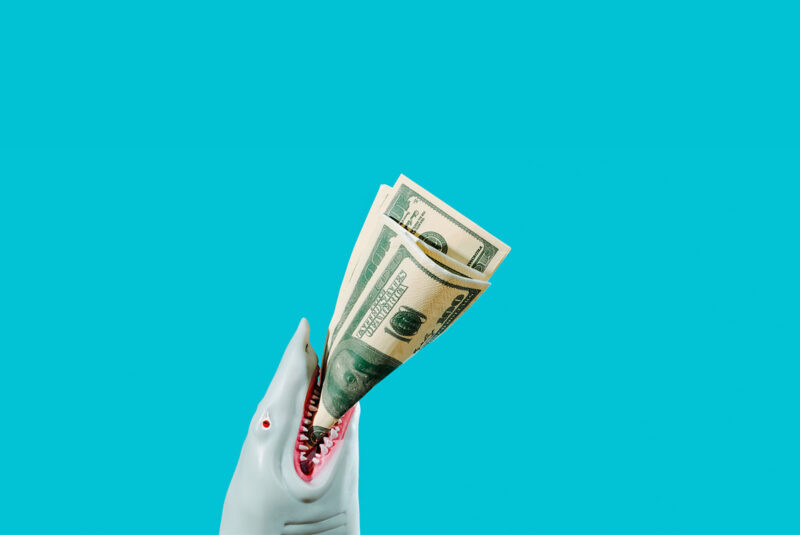Explore your mortgage options
You’ve got an amazing idea for a new business. You’re ready to give the world the product it didn’t know it needed, get offers from all the sharks on “Shark Tank” and become a household name.
Or maybe you’ve got a unique set of skills and want to be your own boss.
You’ve got everything you need to get things started – minus cash. So you reach out to a local bank, credit union or online lender and ask about a small business loan or a startup business loan.
The lender tells you that – before they can offer you a business loan or a business credit card – they want to see a business plan and need to verify that you’ve been in business for at least 6 months.
It’s a catch-22 a lot of entrepreneurs experience when they’re just starting out: You can’t start your business without money, but you can’t get money because you’ve got no business revenue or experience.
A possible solution to what can feel like an impossible situation is to take out a personal loan to fund your small business idea.
See What a Personal Loan Can Do for You
Our partners at Rocket LoansSM are ready to help.
Checking your options won’t affect your credit score.
What Is a Personal Loan?
Here’s a quick rundown on personal loans:
- A personal loan is usually an unsecured loan. That means you won’t have to put up collateral (like a house, car, jewelry, etc.) to get the loan. You apply for the loan through a bank, credit union or online lender.
- Because they are unsecured, personal loans usually have higher interest rates than mortgages or auto loans, but lower rates than credit cards.
- Some lenders may offer secured personal loans. Secured loans have lower interest rates but you have to provide a personal asset as collateral.
- When you take out a personal loan, you agree to a repayment plan that specifies how long you’ll have to repay the entire loan, usually between 12 – 84 months (1 – 7 years). Because the majority of personal loans are fixed-rate loans, you’ll make the same payment on the loan every month.
- Personal loans usually come with an origination fee (the cost to process a loan application) that is typically 2% – 5% of the amount you’ve borrowed. The fee usually gets added to your loan.
- You’ll need a FICO® credit score of 670 or higher to qualify for a personal loan with an interest rate in the 5% – 15% range.
- You can qualify for a personal loan with a lower range credit score, but you’ll likely end up with interest rates that are the same or higher than most credit cards.
- Depending on the lender, you can usually borrow between $1,000 – $100,000. But the maximum amount every lender offers will be different. How much you can borrow and the interest rate you’ll get will depend on your credit score.
Why Use a Personal Loan To Start a Small Business
Unlike a small business loan, you qualify for a personal loan based on your credit score, debt-to-income (DTI) ratio, credit history and your finances. You won’t have to present a business plan or prove how viable your business model is to get the loan – and you can use the money however you choose.
A personal loan application can be processed quickly. You can expect to have the money you’ll need within 7 – 10 business days. This is faster than a small business loan, which typically takes 30 days to a few months for financing.
Because personal loans are typically fixed-rate loans (you make the same monthly payment over the life of the loan), you’ll know in advance how much you need to pay back each month. And that makes it easier to budget for the future.
Challenges of Using a Personal Loan To Start a Small Business
With a personal loan, you’re the borrower – not your business. That means the loan debt gets added to your credit report. If you can’t make your personal loan payments, it can hurt your personal credit. This is different from a small business loan because the borrower is the business and your personal finances are kept separate.
Even with good-to-excellent credit, you’ll likely pay more in interest for a personal loan than you would with a small business loan.
While small business loan amounts usually start in the $10,000 range and can go as high as $1 million, most personal loans max out around $100,000, with most loan amounts ranging from $6,000 – $10,000.[1]
Because a personal loan isn’t a business loan, you won’t be able to develop a credit profile for your business. So, if you decide to apply for a small business loan in the future, you’ll be back at square one (the dreaded catch-22!). Also, unlike a small business loan, the interest on a personal loan isn’t tax deductible.
Ready for a Personal Loan?
Applying through Rocket LoansSM is fast and easy.
Checking your options won’t affect your credit score.
Alternatives to Personal Loans for Small Businesses
Getting a personal loan can be a quick and easy way to get the money you need to start your business – but it’s not the only way. If you’ve got a credit score on the lower end or you’re worried about how a personal loan might impact your credit, there are other options available.
Small Business Administration (SBA) microloans
The U.S. government is a big fan of financing small businesses, offering microloans of up to $50,000 for small business startups through the SBA.
Unlike other business loans, an SBA loan isn’t available through a private lender (like a bank, credit union or online lender). You apply for an SBA loan through designated nonprofit, community-based organizations.
These organizations can provide startup loan money and management and technical support to help you get your business off the ground. The SBA is especially interested in helping small businesses that are:
- Women-owned
- Native American-owned
- Veteran-owned
- LGBTQ-owned
- Based in rural communities
- Minority-owned
If you fall into any of these categories, there are special loan and assistance programs available to help you. To learn more or apply, reach out to your local SBA office.
Grant programs
The only thing better than being able to borrow money for your business is getting that money for free. There are a number of grant programs available that can give you the money you need to start your small business.
These programs have different eligibility requirements and maximum loan amounts, so you’ll need to do some research to find the programs that are best for your situation.
Check out the federally approved programs offered through Grants.gov, or reach out to your local small business development center.
Friends and family
Here’s a little secret: Many household-name CEOs got help from their family and friends. Jeff Bezos, Mark Zuckerberg and Elon Musk all got startup capital from their parents.[2]
While we don’t all have families who can loan us $100,000 (like Zuckerberg), there are ways to work your personal network to get the money you need. Consider asking loved ones for funding. And whether it’s a gift, a loan or an investment, make sure you get a written agreement that specifies what the money is and how you’ll repay it (if it isn’t a gift).
Crowdfunding
If you’ve got lots of followers on social media, try crowdfunding to raise the money you need.
You can also try different crowdfunding websites. Kiva is a microloan platform; Wefunder gives investors shares in your business; and others, like Kickstarter, offer specific rewards to early-stage investors.
The Money You Need for Your Small Business
Choosing a personal loan or a funding alternative for your small business or startup can help you build a strong financial foundation to grow your business.
Once you’ve built that foundation and can prove the viability of your business, you’ll find that it’ll get easier to borrow the money you’ll need to keep growing.
Good luck, and see you on “Shark Tank!”
Get Prequalified for Loans from $2,000 to $45,000
Rocket LoansSM offers personal loans from $2,000 – $45,000. From debt consolidation to unexpected expenses, we’ve got you covered.
Checking your options won’t affect your credit score.
The Short Version
- If you can’t get a small business loan, you can use a personal loan to help start your small business
- Personal loans offer flexibility and the ability to get money quickly, but they can also affect your personal credit
- If a personal loan isn’t right for you, there may be other options available, like Small Business Administration (SBA) loans or grants
U.S. Chamber of Commerce. “Personal Loan Statistics.” Retrieved October 2021 from https://www.chamberofcommerce.org/personal-loan-statistics
The Guardian. “Entrepreneurs are great, but it’s mom and dad who gave them their start.” Retrieved October 2021 from https://www.theguardian.com/business/2021/jan/31/small-business-entrepreneurs-success-parents




